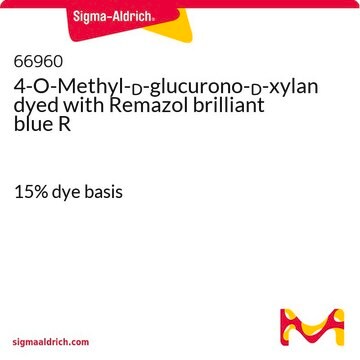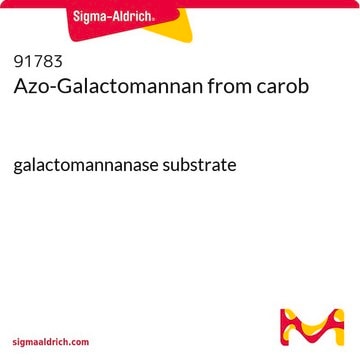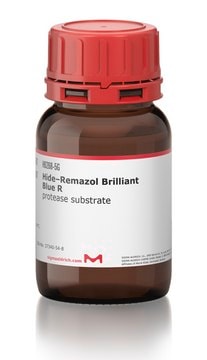M5019
Remazol Brilliant Blue R−D-Xylan
12-18 % (Dye content)
Synonym(s):
4-O-Methyl-D-glucurono-D-xylan−remazol brilliant blue R, RBB-Xylan
Sign Into View Organizational & Contract Pricing
All Photos(1)
About This Item
Recommended Products
biological source
plant
form
powder
composition
, 12-18% (Dye content)
color
dark blue
Related Categories
Application
Remazol brilliant blue R−D-xylan has been used in a study to assess a xylan-degrading strain of Sulfolobus solfataricus. It has also been used investigate thermostable enzymes as biocatalysts in the biofuel industry.
Other Notes
To gain a comprehensive understanding of our extensive range of Polysaccharides for your research, we encourage you to visit our Carbohydrates Category page.
Storage Class Code
11 - Combustible Solids
WGK
WGK 3
Flash Point(F)
Not applicable
Flash Point(C)
Not applicable
Personal Protective Equipment
dust mask type N95 (US), Eyeshields, Gloves
Certificates of Analysis (COA)
Search for Certificates of Analysis (COA) by entering the products Lot/Batch Number. Lot and Batch Numbers can be found on a product’s label following the words ‘Lot’ or ‘Batch’.
Already Own This Product?
Find documentation for the products that you have recently purchased in the Document Library.
Raffaele Cannio et al.
Extremophiles : life under extreme conditions, 8(2), 117-124 (2004-04-06)
Two strains (O(alpha) and X(2)) of the hyperthermophilic crenarchaeon Sulfolobus solfataricus strain MT4 were selected and isolated for their ability to grow on xylan. O(alpha) and X(2), grown on media containing oat spelt xylan and birchwood xylan as the sole
Carl J Yeoman et al.
Advances in applied microbiology, 70, 1-55 (2010-04-03)
Lignocellulose is the most abundant carbohydrate source in nature and represents an ideal renewable energy source. Thermostable enzymes that hydrolyze lignocellulose to its component sugars have significant advantages for improving the conversion rate of biomass over their mesophilic counterparts. We
P Biely et al.
Analytical biochemistry, 144(1), 142-146 (1985-01-01)
New soluble chromogenic substrates were prepared for specific and rapid assays of endo-1,4-beta-xylanases and endo-1,4-beta-glucanases. A soluble beechwood 4-O-methyl-D-glucurono-D-xylan was dyed with Remazol brilliant blue R, and hydroxyethylcellulose was coupled to Ostazin brilliant red H-3B. The assays are based on
Our team of scientists has experience in all areas of research including Life Science, Material Science, Chemical Synthesis, Chromatography, Analytical and many others.
Contact Technical Service






